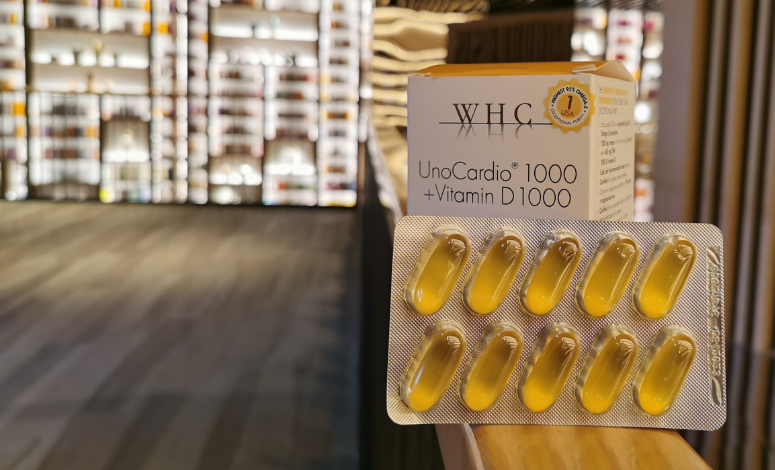


Driven by the increasing awareness of holistic health coupled with Covid-19, Chinese consumers are on a health-conscious movement to spend more on health and lifestyle-related products.
Chinese consumers are taking additional dietary products to boost their immune systems, accelerating China’s vitamins, minerals and supplements market that’s expected to reach a staggering $40 billion in size by 2023.
WHC, a Belgium-based fish oil brand known for its pure omega-3 concentrates, spotted this opportunity and leaped out from the competition to quickly became a category leader on Tmall Global, Alibaba’s leading cross-border B2C marketplace.
“Chinese consumers are very conscious about health. In Asia, people work hard, invest and think more about prevention than dealing with a health issue at the moment. This is very apparent in China,” said Jo Wyckmans, WHC founder and president. “Since last year, considering the pandemic, there’s been an increasing awareness around supplements, and sales have taken off since,” he added.
China’s Sophisticated Appetite for Imported Supplements
WHC was first introduced to China in 2015 through daigou, a Chinese term for an individual or group of people who purchase products while traveling or abroad for mainland consumers. Among them was then 22-year-old Dylan Zhang, who later opened his own import business called InReady Limited to help bring WHC onto Alibaba’s e-commerce platforms.
Back then, the overseas dietary supplement market in China was much smaller compared to what it is now and the market was dominated by a dozen U.S. and Australian brands, said Zhang. Daigou played a significant role introducing mainland consumers to the idea of niche brands and supplements from overseas.
As Chinese consumers’ purchasing power grew over time, Chinese shoppers became increasingly sophisticated and specific, Zhang said people started to educate themselves on the contents of their products which gave boutique and niche brands a chance to flourish. In fact, a McKinsey consumer report in 2020 indicated that 60% of consumers in large Chinese cities said they are label-readers when it comes to food and would decisively avoid things that are not healthy.
This behavior worked in favor of WHC because its product innovations allowed the brand to produce highly concentrated fish oil. Eventually, this has helped WHC meet specific dietary demands that converted into long-term consumer loyalty.
“We wanted make sure they get their omega 3 in one capsule, with extreme purity. We were sure that our product was strong and of high quality, perfect for the Chinese market,” said Wyckmans.
Swim Above the Competition
Like many overseas brands in this sector, WHC’s China debut was exclusively online – first with Taobao Global, Alibaba’s cross-border channel featuring SMEs. When the brand built enough momentum, it launched a flagship store in 2019 on Tmall Global. Along the way, the brand tapped into Alibaba’s extensive supply chain and cross-border fulfillment services, where Cainiao logistics supported local pick-ups from Belgium, global shipping, customs clearance and warehouse storage to local delivery in China.
“Alibaba is the first and biggest cross border platform so it was not a hard decision to make. I honestly didn’t think about choosing anywhere else to start the business,” said Zhang.
Unlike over-the-counter or in-store purchases popular in the U.S. and European markets, the vitamins, minerals and supplements businesses, or VMS for short, in China heavily rely on e-commerce. For Chinese consumers, shopping online is now synonymous with incredible service, convenience and access to more overseas brands.
Marketing-wise, the brand was able to reach more of its target customers through Tmall Global, with China now making up a third of its global sales. Just like Zhang, who initially bought the product for his own family years back, WHC shoppers are savvy, young and generally educated. This group of supplement shoppers tends to pick quality over price, which explains why overseas brands in this category have strong potentials to take off.
Diving Deeper into China’s Untapped Supplement Market
The brand reached a pinnacle during the last Global Shopping Festival on Nov. 11, in terms of brand reputation and sales – achieving more than one million in GMV, tripling its record in 2019. Shoppers placed large orders during the pandemic, partly to stock up, but also because fish oil was becoming an essential supplement widely by all age groups.
“Belgian products or European products in general are widely trusted by Chinese customers thanks to their quality. Many European brands do not compromise quality to rapid growth. They consider brand reputation to be of the utmost priority,” Zhang said.
Instead of chasing additional sales, the next move for WHC is to focus on China’s diverse consumer segments and meeting their needs for localized products. Zhang said he believes the opportunity lies within urban peripheries, second and even third-tier cities. To this end, the brand is launching its bestselling fish oil in smaller bottles at half price later this year to cater to customers who are shopping at lower price ranges.
Sign up for our newsletter to receive the latest Alibaba updates in your inbox every week.





